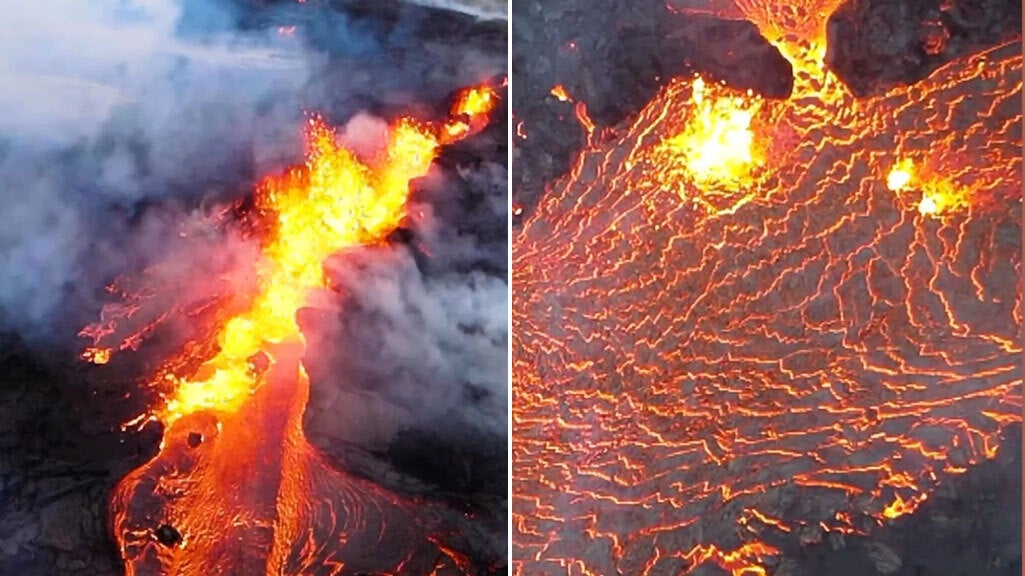Iceland volcano could erupt ‘within hours’, expert warns
Nearby residents evacuate as experts predict an imminent volcanic explosion
Your support helps us to tell the story
From reproductive rights to climate change to Big Tech, The Independent is on the ground when the story is developing. Whether it's investigating the financials of Elon Musk's pro-Trump PAC or producing our latest documentary, 'The A Word', which shines a light on the American women fighting for reproductive rights, we know how important it is to parse out the facts from the messaging.
At such a critical moment in US history, we need reporters on the ground. Your donation allows us to keep sending journalists to speak to both sides of the story.
The Independent is trusted by Americans across the entire political spectrum. And unlike many other quality news outlets, we choose not to lock Americans out of our reporting and analysis with paywalls. We believe quality journalism should be available to everyone, paid for by those who can afford it.
Your support makes all the difference.Iceland is bracing itself for a volcanic eruption that will arrive within “hours or days”, experts have warned.
Around 3,000 residents have evacuated the southwestern town of Grindavik close to the Fagradalsfjall volcanic system in the Reykjanes region.
Over the past 48 hours, Iceland has faced a seismic swarm as 1,485 earthquakes have hit the country. In addition, a magma tunnel is forming underground beneath the town, which South Iceland’s Volcano and Natural Hazards group believe could be 12km long.
The UK foreign office has updated its travel advice, warning that a volcanic eruption is increasingly likely, but it has not warned against travel with flights still touching down at Keflavik International Airport.
The Icelandic Meteorological Office said on Saturday there was a “considerable” risk of an eruption on the Reykjanes peninsula because of the size of the underground magma intrusion and the rate at which it was moving.

Iceland is highly susceptible to natural disasters as it lies on the Mid-Atlantic Ridge – a divergent plate boundary where the North American Plate and the Eurasian Plate are moving away from each other, leading to volcanic eruptions and earthquakes.
“I don’t think it’s long before an eruption, hours or a few days. The chance of an eruption has increased significantly,” Thorvaldur Thordarson, professor of volcanology at the University of Iceland, told state broadcaster RUV.
Páll Einarsson, professor emeritus in geophysics, told RUV: “Considering the intensity, it must be considered probable that there will be an eruption from this magma tunnel, but it is impossible to say where and how long that fissure will be.”

Despite the imminent threat of a volcanic eruption, the UK Foreign Office has not warned against travel to the region.
Its official warning reads: “Earthquakes and indications of volcanic activity have increased above normal levels on the Reykjanes peninsula, southwest of Reykjavik.
“The Icelandic authorities continue to monitor the area closely, particularly the area northwest of Mt Thorbjörn near the Svartsengi power plant and the Blue Lagoon. On 10 November, a Civil Protection Alert was declared after an intense swarm of earthquakes.”

The Reykjanes region has in recent years seen several eruptions in unpopulated areas, but the current outbreak is believed to pose an immediate risk to the town, authorities said.
On Thursday, increased seismic activity prompted the closure of the Blue Lagoon geothermal spa, one of the country’s main tourist attractions.
Reykjanes is a volcanic and seismic hot spot southwest of the capital Reykjavik. In March 2021, lava fountains erupted spectacularly from a fissure in the ground measuring between 500-750 metres long in the region’s Fagradalsfjall volcanic system.
Volcanic activity in the area continued for six months that year, prompting thousands of Icelanders and tourists to visit the scene. In August 2022, a three-week eruption happened in the same area, followed by another in July of this year.
The Fagradalsfjall system, which is around 6km wide and 19km long, had remained inactive for more than 6,000 years prior to the recent eruptions.

Join our commenting forum
Join thought-provoking conversations, follow other Independent readers and see their replies
Comments